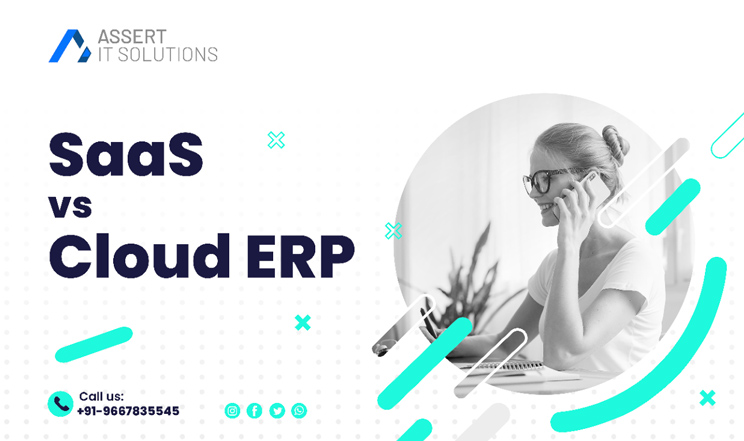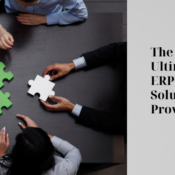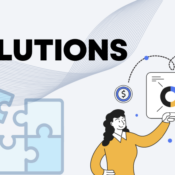SaaS vs Cloud ERP Software: Key Differences

10/04/2023
/
SaaS vs Cloud ERP Software: Key Differences
If you’re running a business, you probably know that you need an ERP system to keep everything in order. ERP stands for enterprise resource planning, which is a fancy way of saying software that helps you manage your finances, inventory, employees, etc. But how do you choose the best ERP system for your business? There are so many options out there, and they all claim to be the best.
Two of the most common deployment options are software-as-a-service (SaaS) and cloud ERP. But what are the differences between these two models, and how can you choose the best one for your business?
In this blog post, we will compare two of the most popular types of ERP systems: SaaS ERP vs cloud ERP.
 SaaS ERP is a type of cloud-based ERP software that is sold through a per-user subscription and is distributed as a service. This means that the software vendor hosts and manages the system on their own servers, and the users can access it via the Internet. The vendor is responsible for providing updates, maintenance, security, and backup for the system. The users do not need to install any software or hardware on their premises, nor do they need to worry about managing or upgrading the system.
SaaS ERP is a type of cloud-based ERP software that is sold through a per-user subscription and is distributed as a service. This means that the software vendor hosts and manages the system on their own servers, and the users can access it via the Internet. The vendor is responsible for providing updates, maintenance, security, and backup for the system. The users do not need to install any software or hardware on their premises, nor do they need to worry about managing or upgrading the system.
 Cloud ERP is a type of web-based ERP software that is hosted on a remote server and accessed via a web browser. Either the software vendor or a third-party hosting provider may own the server. The hosting provider is responsible for maintaining and securing the server infrastructure, while the software vendor is responsible for providing updates and support for the software.
Cloud ERP is a type of web-based ERP software that is hosted on a remote server and accessed via a web browser. Either the software vendor or a third-party hosting provider may own the server. The hosting provider is responsible for maintaining and securing the server infrastructure, while the software vendor is responsible for providing updates and support for the software.
 There is no definitive answer to which deployment option is best for your business, as it depends on various factors such as your business size, budget, needs, preferences, and goals. However, here are some general guidelines that may help you make an informed decision:
If you are a small or medium-sized business with a limited budget and IT resources and you need a simple and standardized ERP solution that can be implemented quickly and easily, then SaaS ERP may be a good option for you.
If you are a large or complex business with a higher budget and IT resources and you need a flexible and customizable ERP solution that can meet your specific needs and requirements, then cloud ERP software may be a better option for you.
There is no definitive answer to which deployment option is best for your business, as it depends on various factors such as your business size, budget, needs, preferences, and goals. However, here are some general guidelines that may help you make an informed decision:
If you are a small or medium-sized business with a limited budget and IT resources and you need a simple and standardized ERP solution that can be implemented quickly and easily, then SaaS ERP may be a good option for you.
If you are a large or complex business with a higher budget and IT resources and you need a flexible and customizable ERP solution that can meet your specific needs and requirements, then cloud ERP software may be a better option for you.
What is SaaS ERP?
 SaaS ERP is a type of cloud-based ERP software that is sold through a per-user subscription and is distributed as a service. This means that the software vendor hosts and manages the system on their own servers, and the users can access it via the Internet. The vendor is responsible for providing updates, maintenance, security, and backup for the system. The users do not need to install any software or hardware on their premises, nor do they need to worry about managing or upgrading the system.
SaaS ERP is a type of cloud-based ERP software that is sold through a per-user subscription and is distributed as a service. This means that the software vendor hosts and manages the system on their own servers, and the users can access it via the Internet. The vendor is responsible for providing updates, maintenance, security, and backup for the system. The users do not need to install any software or hardware on their premises, nor do they need to worry about managing or upgrading the system.
Benefits:
- Lower upfront costs: Since there is no need to purchase or install any hardware or software, the initial investment is minimal. The users only pay for what they use, usually on a monthly or annual basis.
- Faster deployment: Since the system is already set up and ready to use, the implementation time is shorter than other deployment options. The users can start using the system as soon as they sign up for the service.
- Scalability: Since the system is hosted on the vendor’s servers, it can easily scale up or down according to the changing needs of the users. The users can add or remove features, modules, or users as needed without affecting the performance or availability of the system.
- Accessibility: Since the system is accessible via the internet, the users can access it from anywhere, anytime, and from any device. This enables remote work, collaboration, and mobility for the users.
Drawbacks of SaaS ERP are:
- Depending on the Vendor: When you use a system controlled by a company, you have to rely on them for everything. You can't change much or have full control. You also need to trust that they'll keep it working well and safe.
- Not Much Customization: Since the system is used by lots of people, it's made to work for everyone. That means you can't change it much to fit your specific needs. You might have to settle for what's available.
- Need Good Internet: Because this system works over the Internet, you must have a strong and fast Internet connection. If your internet is slow or stops working, the system won't work well either.
What is Cloud ERP?
 Cloud ERP is a type of web-based ERP software that is hosted on a remote server and accessed via a web browser. Either the software vendor or a third-party hosting provider may own the server. The hosting provider is responsible for maintaining and securing the server infrastructure, while the software vendor is responsible for providing updates and support for the software.
Cloud ERP is a type of web-based ERP software that is hosted on a remote server and accessed via a web browser. Either the software vendor or a third-party hosting provider may own the server. The hosting provider is responsible for maintaining and securing the server infrastructure, while the software vendor is responsible for providing updates and support for the software.
Benefits of Cloud ERP are:
- Lower maintenance costs: Since there is no need to maintain any hardware or software on-premises, the maintenance costs are reduced. The hosting provider takes care of all aspects related to server management, such as security, backup, recovery, and uptime.
- More customization options: Since there is more flexibility in choosing and configuring the server infrastructure, there are more customization options available for cloud ERP. The users can choose from different types of servers, operating systems, databases, and applications. The users can also customize their own user interface (UI), workflows, reports, and integrations according to their preferences.
- Higher security standards: Since cloud ERP uses encryption protocols such as SSL, HTTPS, and IPsec VPNs to protect data transmission over the internet, it offers higher security standards than other deployment options. The hosting provider also employs various security measures, such as firewalls, antivirus software, and intrusion detection systems, to prevent unauthorized access or attacks on the server.
Disadvantages:
- Higher upfront costs: Since there is a need to purchase or rent server space and bandwidth from the hosting provider, the upfront costs are higher than SaaS ERP. The users also have to pay for the software license, which may be based on the number of users, features, or modules.
- Longer deployment time: Since there is a need to set up and configure the server infrastructure and the software application, the deployment time is longer than SaaS ERP. The users may also have to migrate their existing data and integrate their existing systems with the cloud ERP, which may require additional time and resources.
- Dependency on the Internet: Like SaaS ERP, cloud ERP also requires a stable and fast Internet connection to function properly. Any issue with the internet connection may affect the performance or availability of the system.
Cloud ERP vs SaaS ERP—which is best for you?
 There is no definitive answer to which deployment option is best for your business, as it depends on various factors such as your business size, budget, needs, preferences, and goals. However, here are some general guidelines that may help you make an informed decision:
If you are a small or medium-sized business with a limited budget and IT resources and you need a simple and standardized ERP solution that can be implemented quickly and easily, then SaaS ERP may be a good option for you.
If you are a large or complex business with a higher budget and IT resources and you need a flexible and customizable ERP solution that can meet your specific needs and requirements, then cloud ERP software may be a better option for you.
There is no definitive answer to which deployment option is best for your business, as it depends on various factors such as your business size, budget, needs, preferences, and goals. However, here are some general guidelines that may help you make an informed decision:
If you are a small or medium-sized business with a limited budget and IT resources and you need a simple and standardized ERP solution that can be implemented quickly and easily, then SaaS ERP may be a good option for you.
If you are a large or complex business with a higher budget and IT resources and you need a flexible and customizable ERP solution that can meet your specific needs and requirements, then cloud ERP software may be a better option for you.
Conclusion:
SaaS ERP and cloud ERP are both viable options for businesses that want to leverage the benefits of cloud computing for their ERP systems. However, they have different features, advantages, and disadvantages that make them suitable for different types of businesses. Therefore, it is important to understand the differences between them and evaluate your own needs and goals before choosing the best one for your business.Recent Posts
Monika Narriya/0 Comments
Why are ERP solutions important in the education sector?
Monika Narriya/0 Comments
Which is the best ERP solution provider company?
Monika Narriya/0 Comments
How do we select the right ERP solution for our businesses?
Sumit Kumar/0 Comments
9 Most In-Demand Programming Languages for 2024
Sumit Kumar/0 Comments
Best Time to Post on Social Media – 2024 Guide
Sumit Kumar/0 Comments
Why You Should Consider Semantic HTML for SEO
All Categories
- Bing
- Blockchain
- Blog
- Branding
- Case Study
- Content Marketing
- Conversion Rate Optimization
- Cryptocurrency
- Digital Currency
- Digital Marketing
- Email Marketing
- ERP Solutions
- Facebook Marketing
- Google Ads
- Google Updates
- Graphic Designing
- Hire Developers
- Image SEO
- Influencer Marketing
- IT
- Local SEO
- Machine Learning
- Mobile Application Development
- Pay Per Click
- Pinterest SEO
- Podcast Hosting
- React JS
- Reddit & Quora
- Search Engine Optimization
- SEO Copywriting
- Social Media Marketing
- Software
- Software Development
- Technology
- UX and UI
- Web Designs
- Web Hosting
- Website Development
- Website Redesigning
- YouTube SEO








